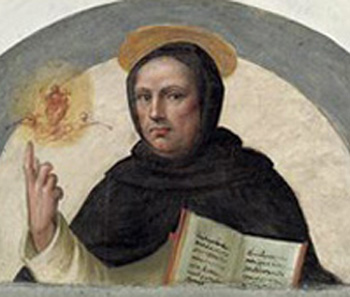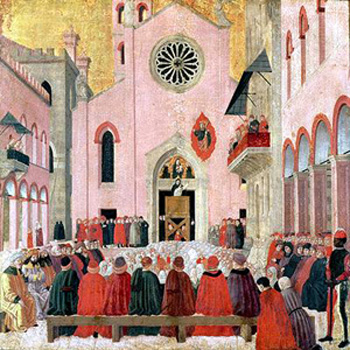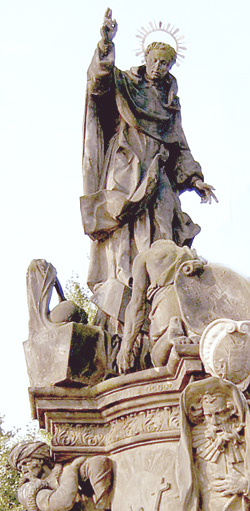 |
The Saint of the Day
St. Vincent Ferrer – April 5
Prof. Plinio Corrêa de Oliveira
Biographical selection:
St. Vincent Ferrer was born at Valencia, Spain, on January 23, 1357. Before his birth his vocation was announced to his parents in a miraculous way. The whole city of Valencia celebrated his birth and went to his baptism.

St. Vincent Ferrer - Fresco by Fra Bartolommeo, c. 1500
|
He entered the Dominican Order at age 18, soon revealing great gifts for preaching. He was sent to Cataluña to study, and then Lerida, where he studied under Cardinal Peter de Luna. Later, this Cardinal was elected pope and became Benedict XIII at the time when the Great Western Schism divided the Church. This pope invited Vincent to be his auxiliary, but he refused.
Vincent started a great work of evangelization as a preacher. He preached all over France, Italy, Spain, Portugal and England, the latter by special request of King Henry IV. The most hardened sinners could not resist his words. He converted countless Catholics from their bad lives and customs, as well as brought numerous Jews, Muslims and Schismatics to the Catholic Faith.
The corruption of customs, during the Hundred Years’ War and the Schism, made the apostolate of St. Vincent indispensable. What was needed was an apostle with a terrible message who could shake the conscience of sinners delivered to their excesses. His sermons were about the most frightening themes of Catholic doctrine: the terrible responsibility of sinners, the Judgment of God, Hell, eternity, etc. He had the gift to speak with a great energy, always using a language accessible to his audience. He also became noted for the great miracles he worked wherever he went.
The fame of his sanctity reached the Moorish King of Granada, who invited him to his kingdom to preach. However, he converted so many that some of the ministers of the King, fearful for the future of the Muslim religion, asked the sovereign to send the great missionary away.
During the sorrowful exile of the Popes in Avignon, St. Vincent condemned Benedict XIII, who was one of the three ecclesiastics simultaneously claiming the Papacy at that time, and gave his complete support to Pope Martin V, who had been elected in the Council of Constance.
In 1419, he died in Bretagne, France at 62 years of age.
Comments of Prof. Plinio:
In the 14th century, Europe entered into a process of decline from the apogee it had reached in the 12th and 13th centuries. It was a tremendous decadence symbolized by the exile of the Popes in Avignon, where they were under the control of the King of France. This calamitous period also saw a Schism in the Church, in which three men claimed to be popes, each one with a different story and elected by different groups of Prelates.

St. Vincent Ferrer preaching in front of the Church of Sant' Eufemia in Verona - Fra Bartolomeo, c. 1500
|
One of the goals of the Council of Constance in 1414 was to resolve this crisis. The three popes were asked to resign, and the Bishops went on to elect another person, Pope Martin V, as the only legitimate Pope.
It is not difficult to imagine that with three popes ordering different things at the same time, a great confusion was introduced in Christendom: confusion among the Prelates, clergy, and also the faithful.
Such an atmosphere of discord and intrigue necessarily caused a moral decay of the clergy and faithful. One could say that it was the whole Middle Ages that entered into putrefaction at that time. It was primarily a moral decadence rather than an intellectual one. It was not a great heresy, but a Great Schism, shaking the unity of the Church and of Christendom. The moral deterioration that accompanied it, a first explosion of pride and sensuality, would generate the intellectual errors of the Revolution.
Divine Providence sent two great saints to prevent this moral and intellectual deterioration: St. Vincent Ferrer and St. Thomas Aquinas. St. Thomas was the dike to stop the intellectual corruption – he became the Doctor of the Doctors. The other dike was St. Vincent Ferrer, who was, we can say, the Preacher of the Preachers.
I think that no one has surpassed St. Vincent Ferrer as a popular preacher. Even St. Anthony Mary Claret, who was an enormously efficacious preacher in the 19th century, did not have the momentous effect of St. Vincent Ferrer. St. Vincent used to say that he was the Angel of the Apocalypse that God had sent to announce the decadence of Christendom and the beginning of the end times.

St. Vincent Ferrer on Charles Bridge in Prague
|
In fact, he fought a great deal to restore the corrupted morals and customs in order to stop that decline. The selection tells us the great success he had in converting Catholics from their tepidity and corruption, and also Jews, Muslims and Schismatics from their respective errors. The fact that he preached incessantly on terrifying themes shows us that he was not speaking principally to ardent souls, but rather to lukewarm Catholics. He was shaking their consciences in order to promote a reaction and stop the decadence. He delivered his discourses with so much energy that he filled the most insensible with terror. To employ fear is another way to convince. His gift of miracles and the sanctity of his life added weight to his words.
With this, we understand the colossal number of conversions he produced. But even as numerous as they were, they were insufficient. They did not give birth to an organized movement to destroy the Revolution born in the first half of the 14th century. His words were not received by his contemporaries as well as they should have been. He converted many souls, no doubt, but society as such did not convert, nor did Christendom change its path. The latter continued its process toward its end.
St. Vincent Ferrer was a dike that Divine Providence raised to contain the waters of that river; but the evil of men and the action of the Revolution broke the dike and the torrent broke over everything, carrying it into the abyss.
Nonetheless, the great figure of St. Vincent Ferrer stands at the threshold of that historic era, announcing the catastrophes that would come, as they did. Like the Prophets of the Old Covenant announcing the chastisements to the people of God, so the monumental figure of St. Vincent Ferrer stands at that threshold of History that marks the beginning of the Revolution.
Today, we are living in the last steps of that same revolutionary process he came to prevent. So, let us ask him to give us the graces that were refused at his time, the graces to rebuild society to an even more glorious Christendom than it reached in the Middle Ages.


  | | Prof. Plinio Corrêa de Oliveira | |
The Saint of the Day features highlights from the lives of saints based on comments made by the late Prof. Plinio Corrêa de Oliveira. Following the example of St. John Bosco who used to make similar talks for the boys of his College, each evening it was Prof. Plinio’s custom to make a short commentary on the lives of the next day’s saint in a meeting for youth in order to encourage them in the practice of virtue and love for the Catholic Church. TIA thought that its readers could profit from these valuable commentaries.
The texts of both the biographical data and the comments come from personal notes taken by Atila S. Guimarães from 1964 to 1995. Given the fact that the source is a personal notebook, it is possible that at times the biographic notes transcribed here will not rigorously follow the original text read by Prof. Plinio. The commentaries have also been adapted and translated for TIA’s site.
|
Saint of the Day | Home | Books | CDs | Search | Contact Us | Donate

© 2002- Tradition in Action, Inc. All Rights Reserved
|
 |

|